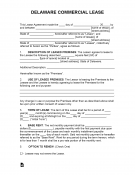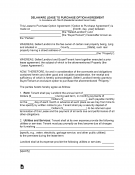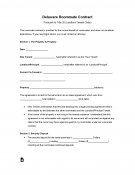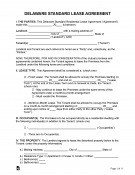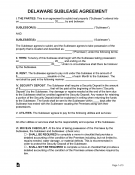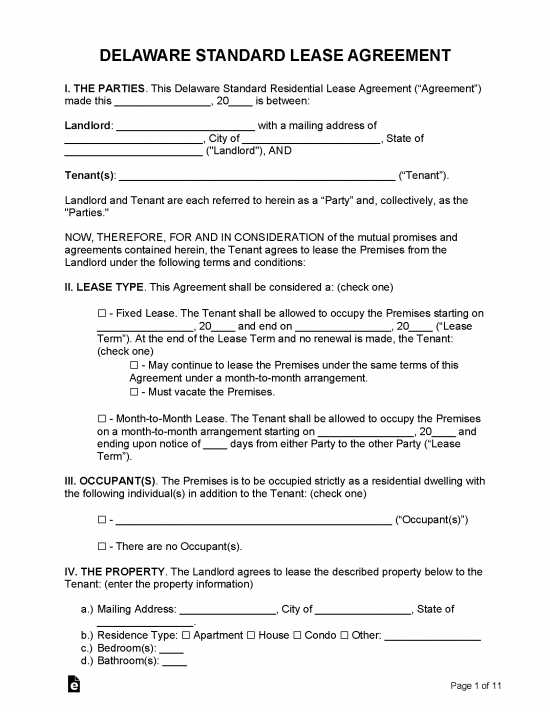Delaware lease agreements are documents that govern the contractual relationship between a landlord and tenant over the course of a tenant’s possession of a landlord’s property. The lease agreement will lay out the terms of the lease, including the expected rent and the landlord’s obligations. Lease agreements can be an effective way of preventing disputes by keeping clear what is expected for both the landlord and tenant.
Contents
By Type (6)
- Commercial Lease Agreement
- Month-to-Month Lease Agreement
- Rent-to-Own Lease Agreement
- Roommate Lease Agreement
- Standard Lease Agreement
- Sublease Agreement
Download: Adobe PDF, MS Word, Rich Text Format
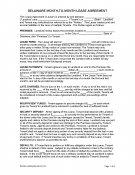 Month-to-Month Lease Agreement
Month-to-Month Lease Agreement
Download: Adobe PDF, MS Word, Rich Text Format
Download: Adobe PDF, MS Word, Rich Text Format
Download: Adobe PDF, MS Word, Rich Text Format
Download: Adobe PDF, MS Word, Rich Text Format
Download: Adobe PDF, MS Word, Rich Text Format
Landlord-Tenant Laws
Statutes – Title 25, Part III (Residential Landlord Tenant Code)
Required Disclosures (3)
Landlord-Tenant Code (Tit. 25 § 5118) – The landlord must give a copy of the Landlord-Tenant Code to the Tenant.
Lead-Based Paint Disclosure – For any residential dwelling that was constructed prior to 1978.
Owner/Agent Disclosure (Tit. 25 § 5105) – Owner/Agent must include information in the rental document as to who owns the residence.
Security Deposit Laws
Maximum Amount ($)
A landlord may not charge more than one month’s rent as a security deposit for any lease of a year or longer (Tit. 25 § 5514).
Returning to Tenant
The landlord must return the security deposit to the tenant within twenty (20) days after the termination or expiration of the rental agreement. If the landlord chooses to retain some of the security deposit in order to cover costs associated with the tenant’s time in possession of the property, then the landlord must provide the tenant with an itemized list of all deductions to be taken, including a description of the items and price. The tenant in turn has ten (10) days to accept the landlord’s itemization, or dispute it with a response in writing (Tit. 25 § 5514).
When is Rent Due? (grace period)
Rent is due at the time and place agreed upon in the rental agreement. If a landlord does not maintain an office or consistent place to pay rent, the tenant is entitled to a three (3) day grace period (Tit. 25 § 5501).
Eviction Notice (non-payment)
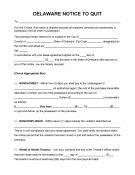 5-Day Delaware-Eviction-Notice-to-Quit-Form-Day Notice to Pay or Quit – The landlord has the right to give a five (5) day notice to quit if rent is not paid on the due date. If not paid-in-full, the landlord has the right to terminate the lease and begin a forcible entry and detainer action (Tit. 25, § 5502).
5-Day Delaware-Eviction-Notice-to-Quit-Form-Day Notice to Pay or Quit – The landlord has the right to give a five (5) day notice to quit if rent is not paid on the due date. If not paid-in-full, the landlord has the right to terminate the lease and begin a forcible entry and detainer action (Tit. 25, § 5502).
Download: Adobe PDF
Maximum Fees ($)
Late Rent Penalties
A landlord may charge a tenant no more than five (5) percent of the monthly rent as a late fee (Tit. 25, § 5502)
NSF Checks
Delaware law does not specify whether a fee may be imposed for providing a rent check with insufficient funds, or if so how much it may be. The best practice, if a landlord plans to charge a fee, is to identify the fee in the rental agreement, and to keep it reasonably related to costs borne by the landlord for the lack of funds, in order for the order to be enforced.
Tenant’s Unclaimed Property
In the case of personal property left behind after an eviction, a landlord must hold on to any property found for at least seven (7) days. The tenant will be responsible for the cost of storing the property during this time. If the tenant does not respond within this time period, the landlord may dispose of the remaining property as he or she sees fit. (Tit. 25, § 5507(e))
